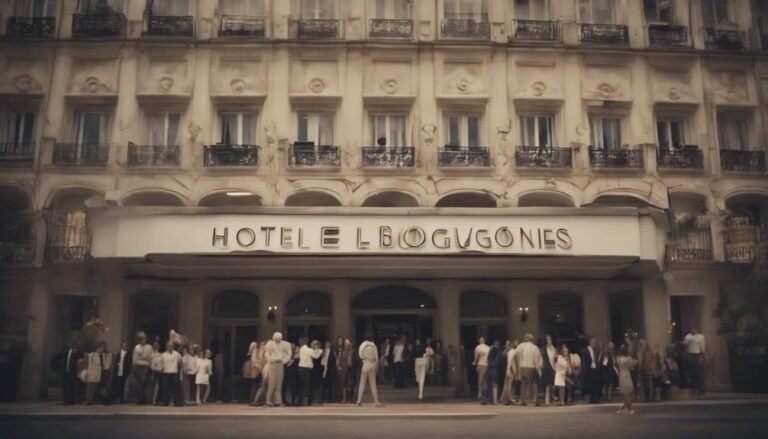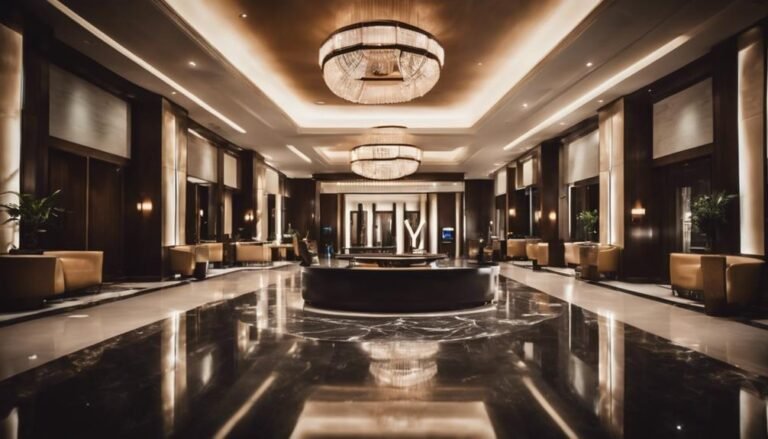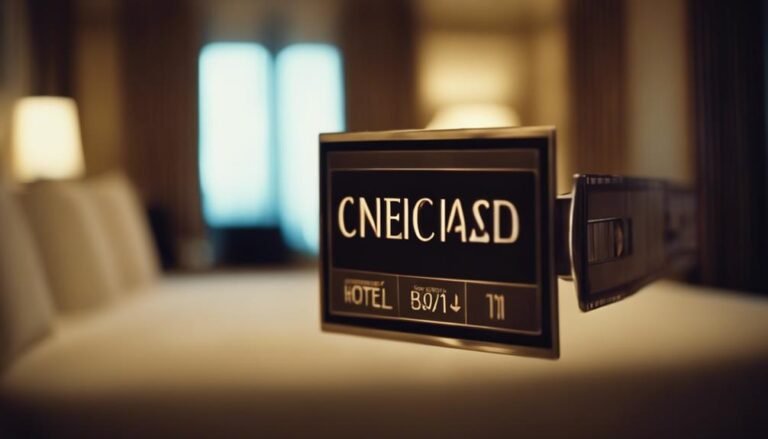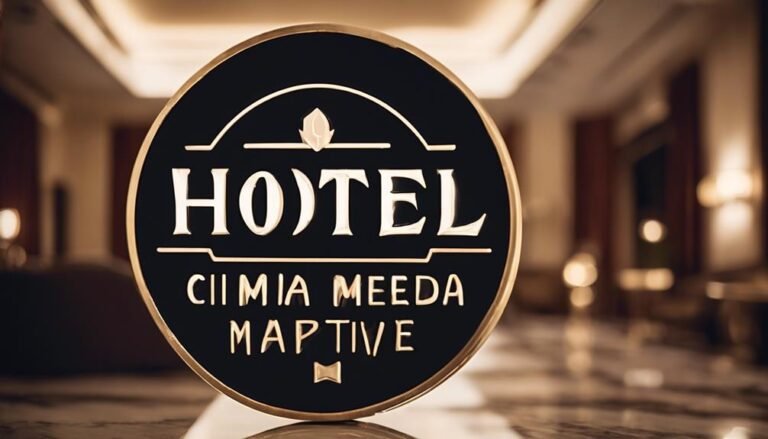Event Marketing Strategies for Hospitality Success
Have you ever considered how strategic event marketing can be the key to unlocking success in the competitive hospitality industry?
Understanding the nuances of event marketing strategies tailored to the hospitality sector can significantly impact your business's growth and brand awareness.
By focusing on selecting the right event type, crafting compelling messaging, and enhancing guest experiences, you can set yourself apart from the competition and create lasting impressions.
Stay tuned for insights on leveraging influencer partnerships and measuring the effectiveness of your event marketing efforts to drive continuous improvement and success.
Key Takeaways
- Utilize a mix of online and offline channels for effective promotion.
- Understand audience preferences and behaviors for personalized experiences.
- Align event goals with chosen types and continuously optimize based on metrics.
- Enhance guest experience and measure success through feedback and data analysis.
Importance of Event Marketing
Understanding the significance of event marketing is crucial for achieving success in the hospitality industry. When it comes to event marketing effectiveness, metrics play a vital role in measuring the impact of your efforts. By analyzing metrics such as attendance rates, social media engagement, and post-event surveys, you can gain valuable insights into what resonates with your audience and how to enhance future events.
Event promotion is another key aspect that requires strategic planning and innovative strategies. Utilizing a mix of online and offline channels can help maximize reach and engagement. Implementing targeted email campaigns, social media contests, influencer partnerships, and personalized invitations are just a few tactics that can drive interest and attendance.
To ensure your event marketing efforts are successful, it's essential to continuously evaluate and adjust your strategies based on the data and feedback collected. By staying agile and adapting to the ever-changing landscape of event marketing, you can position your hospitality business for long-term success.
Understanding Your Target Audience
To effectively engage your target audience in event marketing for hospitality success, conduct thorough research to identify their preferences and behaviors. Audience segmentation is crucial in tailoring your event to specific demographic groups. Begin by conducting demographic analysis to understand the age, gender, income level, and other relevant characteristics of your target audience. This information will provide valuable insights into crafting personalized experiences that resonate with attendees.
Once you have segmented your audience, dive deeper into behavioral insights to uncover their preferences and motivations. Understanding what drives your audience to attend events will allow you to create engagement strategies that cater to their needs. Whether it's offering interactive sessions, networking opportunities, or exclusive perks, align your event offerings with what appeals most to your target audience.
| Audience Segmentation | Engagement Strategies |
|---|---|
| Demographic Analysis | Personalized Experiences |
| Behavioral Insights | Interactive Sessions |
Choosing the Right Event Type
When selecting the right event type, ensure your goals align with the event's purpose. Conduct a thorough analysis of your target audience. Meticulously check the suitability of the venue.
By aligning your event goals with the chosen type of event, you increase the likelihood of achieving success and meeting your objectives.
Analyzing your target audience helps tailor the event to their preferences and ensures a more engaging experience. Verifying venue suitability is crucial for a seamless and memorable event execution.
Event Goals Alignment
Choosing the appropriate event type is crucial for aligning your event goals with your overall hospitality success strategy. When selecting the right event, consider how it will contribute to your goal achievement and successful event execution.
Whether it's a conference, a product launch, or a networking event, each type offers unique opportunities to showcase your brand and engage with your audience effectively. For instance, a product launch can generate buzz and drive sales, while a conference can position your hospitality business as an industry leader.
Target Audience Analysis
Analyzing your target audience is key in selecting the right event type to ensure optimal engagement and alignment with your hospitality success strategy. To effectively choose the event type that resonates with your audience, consider the following strategies:
- Demographic Analysis: Understand the age, gender, income level, occupation, and other relevant demographic factors of your target audience.
- Behavior Segmentation: Segment your audience based on behaviors such as interests, preferences, buying habits, and interactions with your brand.
- Engagement Preferences: Determine how your audience prefers to engage with events – virtual, in-person, interactive, etc.
- Competitor Analysis: Look into the events your competitors are hosting for similar audiences to identify gaps and opportunities for differentiation.
Venue Suitability Check
Wondering how to pinpoint the perfect venue to elevate your event marketing strategy in the hospitality industry?
When conducting a venue inspection, focus on aspects like capacity, amenities, and ambiance. Location scouting is crucial; consider accessibility, parking, and proximity to public transport.
Analyze if the venue aligns with the event type – a corporate conference may require a different setting than a product launch. Ensure the venue reflects your brand and resonates with your target audience.
Look for spaces that offer versatility for various setups and activities. Data-driven decisions can guide you in selecting a venue that maximizes engagement and overall guest experience.
Crafting Compelling Event Messaging
Craft event messaging that captivates your audience with a blend of creativity and data-driven precision. To ensure your event messaging is compelling and effective, follow these key strategies:
- Understand Your Audience: Craft messages tailored to the demographics, preferences, and behaviors of your target attendees. Use data analytics to segment your audience and personalize your messaging accordingly.
- Create a Strong Value Proposition: Clearly communicate what makes your event unique and why attendees should participate. Highlight the benefits, experiences, or knowledge they'll gain by attending.
- Utilize Engaging Visuals: Incorporate eye-catching graphics, videos, or interactive content to make your messages visually appealing and memorable. Visuals can significantly enhance the impact of your event messaging.
- Include Call-to-Actions: Encourage immediate responses from your audience by including clear and compelling calls-to-action in your event messaging. Whether it's to register, learn more, or share the event, CTAs drive action and engagement.
Leveraging Influencer Partnerships
When it comes to leveraging influencer partnerships for your hospitality events, it's crucial to carefully consider the influencer selection criteria, ensuring their audience aligns with your target market.
Establishing clear collaboration guidelines with influencers can help maintain brand consistency and maximize the impact of their promotions.
Utilizing performance measurement tools will enable you to track the success of your influencer partnerships and make data-driven decisions for future events.
Influencer Selection Criteria
To ensure successful influencer partnerships in event marketing, meticulous selection criteria based on audience alignment, engagement metrics, and brand fit are crucial.
When selecting influencers for your hospitality event, consider the following criteria:
- Audience Alignment: Choose influencers whose followers align with your target audience to maximize impact.
- Engagement Metrics: Look for influencers with high engagement rates, indicating an active and responsive audience.
- Brand Fit: Ensure that the influencer's values and content align with your hospitality brand to maintain authenticity.
- Track Record: Evaluate past collaborations and performance metrics to gauge the influencer's effectiveness in driving engagement and conversions.
Collaboration Guidelines
Leveraging influencer partnerships effectively requires establishing clear collaboration guidelines that align with your event marketing objectives and maximize audience engagement. When setting up these guidelines, consider the collaboration benefits that influencers bring, such as expanded reach and credibility.
Effective communication strategies are crucial in maintaining a cohesive partnership. Teamwork dynamics play a vital role in influencer collaborations, so ensure that roles and responsibilities are clearly defined to avoid misunderstandings. Implement project management techniques to keep tasks on schedule and monitor progress efficiently.
Performance Measurement Tools
Utilize advanced analytics tools to track and evaluate the performance of your influencer partnerships effectively. When it comes to leveraging influencer partnerships for your hospitality events, data analytics and performance tracking are key.
Here are four essential strategies to maximize the effectiveness of your influencer collaborations:
- Set Clear Objectives: Define specific KPIs aligned with your event goals to measure the impact of influencer partnerships accurately.
- Monitor Engagement Metrics: Use data analytics to track metrics such as likes, shares, comments, and website traffic driven by influencers.
- ROI Analysis: Conduct a thorough analysis of the return on investment generated through influencer collaborations.
- Continuous Optimization: Regularly review performance data to optimize future partnerships and enhance overall event marketing strategies.
Utilizing Social Media Promotion
Enhance your event marketing success by harnessing the power of social media promotion to engage with your target audience effectively. Social media engagement is a crucial tool for boosting event branding and increasing online promotion. Start by creating a social media calendar outlining key event highlights, promotions, and engaging content to keep your audience excited.
Utilize platforms like Instagram, Facebook, and Twitter to reach a wider audience and create buzz around your event.
To maximize audience engagement, encourage attendees to share their experiences by creating event-specific hashtags and interactive posts. Run contests or polls to generate excitement and encourage interaction.
Leverage social media analytics to track engagement metrics such as likes, shares, and comments to measure the success of your online promotion efforts. Use this data to refine your social media strategy and tailor content to better resonate with your audience.
Enhancing Guest Experience
To elevate guest experience, consider offering personalized welcome amenities tailored to their preferences. This enhances the sense of exclusivity and care. Implement a seamless check-in process utilizing technology for efficiency and convenience. This sets a positive tone for the rest of their stay. These small yet impactful touches can leave a lasting impression, fostering loyalty and positive reviews.
Personalized Welcome Amenities
Crafting personalized welcome amenities tailored to each guest's preferences elevates the overall guest experience and fosters a lasting impression of hospitality excellence. To ensure guest satisfaction and create memorable moments, consider the following strategies:
- Pre-Arrival Surveys: Send personalized surveys to guests before their arrival to gather information about their preferences, such as favorite snacks or drinks.
- Customized Welcome Gifts: Prepare welcome gifts based on the information collected, such as a bottle of their favorite wine or a selection of local treats.
- Personalized Notes: Include handwritten notes addressing guests by name, welcoming them to the property, and highlighting special amenities or services tailored to their preferences.
- Special Requests Fulfillment: Anticipate guest needs by fulfilling special requests, such as providing extra pillows for guests who prefer a more plush sleeping experience.
Seamless Check-In Process
Optimize guest satisfaction by streamlining the check-in process to ensure a seamless and efficient experience upon arrival at your hospitality establishment. Implementing mobile check-in and contactless options can significantly reduce wait times and enhance guest convenience.
Automated registration and self-service kiosks empower guests to complete the check-in process swiftly, minimizing potential bottlenecks. By leveraging technology for a smoother check-in experience, you not only improve operational efficiency but also elevate the overall guest experience.
These modern solutions cater to guests seeking quick and hassle-free interactions, setting a positive tone for their stay. Embracing mobile check-in and self-service options demonstrates your commitment to providing a convenient and streamlined process, ultimately leaving a lasting impression on your guests.
Measuring Event Success
Using specific key performance indicators (KPIs) is essential for evaluating the success of your hospitality events. To measure the impact of your event effectively, consider the following key metrics:
- Attendee Feedback: Collecting feedback from attendees through surveys or direct interactions can provide valuable insights into their satisfaction levels, preferences, and areas for improvement.
- ROI Analysis: Conducting a thorough return on investment analysis will help you determine if the event achieved its financial objectives and if it was a profitable endeavor for your hospitality business.
- Attendance Numbers: Tracking the number of attendees compared to your initial goals can indicate the event's overall success in attracting participants.
- Social Media Engagement: Monitoring social media metrics such as likes, shares, and comments can give you a sense of the event's online reach and audience engagement levels.
Post-Event Follow-Up Strategies
To maximize the impact of your hospitality event, implementing effective post-event follow-up strategies is crucial for maintaining engagement and fostering long-term relationships with attendees. One key strategy is feedback collection through post-event surveys. By gathering feedback promptly, you can assess attendee satisfaction, identify areas for improvement, and show your commitment to enhancing future events based on their input.
Another powerful tool for post-event follow-up is email marketing. Sending personalized follow-up emails can help you stay connected with attendees, express gratitude for their participation, and provide relevant content or promotions to keep them engaged. Crafting engaging follow-up campaigns can drive continued interest and loyalty among your audience, leading to higher attendance rates at future events.
| Post-Event Follow-Up Strategies | Benefits | Tips |
|---|---|---|
| Feedback collection | Understand attendee satisfaction | Send surveys promptly after the event |
| Email marketing | Maintain attendee engagement | Personalize emails for better impact |
| Follow-up campaigns | Drive interest in future events | Include exclusive offers or content |
Continuous Improvement and Adaptation
Enhance your hospitality event success by continuously refining and adapting your strategies to meet evolving industry trends and attendee preferences. To achieve this, consider the following strategies:
- Feedback Implementation: Gather feedback from attendees through surveys, social media polls, and direct interactions. Implement suggestions for improvement to enhance future events and increase attendee satisfaction.
- Data Analysis: Utilize data analytics tools to track key performance indicators such as attendance rates, engagement levels, and revenue generation. Analyze this data to identify patterns and areas for event optimization.
- Audience Engagement: Develop innovative ways to engage attendees before, during, and after the event. Incorporate interactive elements, networking opportunities, and personalized experiences to create lasting impressions.
- Event Optimization: Continuously evaluate the effectiveness of your event marketing strategies and promotional tactics. Adjust your approach based on performance metrics and industry benchmarks to ensure maximum impact and return on investment.
Conclusion
In conclusion, when it comes to event marketing in the hospitality industry, it's crucial to understand your audience. Choose the right type of event and craft compelling messaging. Collaborate with influencers, enhance guest experience, measure success, and follow up post-event.
Remember, Rome wasn't built in a day, so continuous improvement and adaptation are key to achieving success in this competitive landscape. Keep pushing the envelope and watch your hospitality business thrive!







